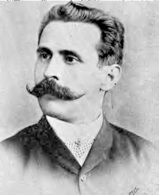3.7.8 The cultivation of literary criticism by Nicolás Heredia (1855 – 1901)

Nicolás Heredia, in addition to his narrative texts “A Businessman” and “Leonela,” also worked as a literary critic. Although he sometimes called himself an impressionist, his critical texts do not simply convey immediate aesthetic perceptions derived from reading the works; rather, he is able to delve into the core of the argument and establish correlations with current literary trends and the relevant historical context.
It is true that his ideas adhered closely to what was already established in literary criticism – he was not a renovator in this sense – but he still presented interesting ideas, all of them nuanced by his intellectual modesty and the desire to point out the values of the works and generally motivate the cycle of writing and reading.
In 1892, Nicolás Heredia published the book “Puntos de vista” (Points of View), which compiles a series of speeches he gave at the Círculo de la Juventud Liberal (Liberal Youth Circle) and at the Matanzas Lyceum. This book examines both works conceived on the island and those already emerging as valuable for world literature. Worthy of mention are the works of Julián del Casal and Enrique Piñeyro, as well as that of the naturalist Emile Zolá.
Regarding Enrique Piñeyro, although he refers vaguely, in a tone that suggests a certain censure, to his rather cold style, lacking rhetorical and dramatic resources, he praises the elegance of his prose and the fluidity of his style, which he does not consider “everyone’s style,” as Aniceto Valdivia had once somewhat frivolously asserted.
His views on Julián del Casal, whom he considered more of a master of form, demonstrate that this critic, and Cuban scholars in general, had not accurately assessed the innovative role of modernism not only as a foreign literary movement but also its potential to reflect truly national problems.
He also left some opinions on colonial theatre, in which he criticized the implementation of foreign trends and, as was often the case, comic theatre, which he also considered imported, perhaps due to its links with Spanish humorous dramaturgy.
Nicolás Heredia’s critical work, while not excessively in-depth or systematic, was highly positive due to its measured tone and the vision his practices indicate regarding the need to encourage artistic creation rather than discourage it.








